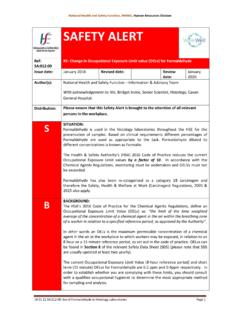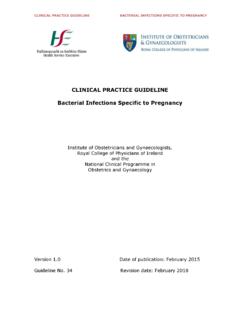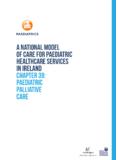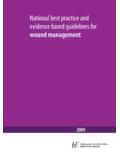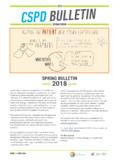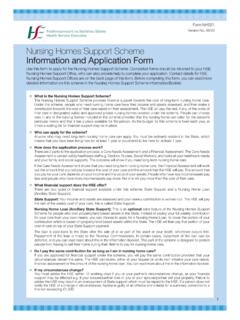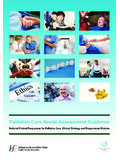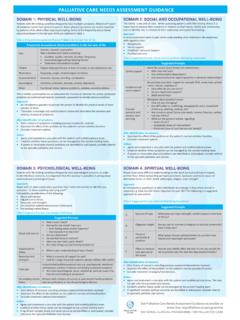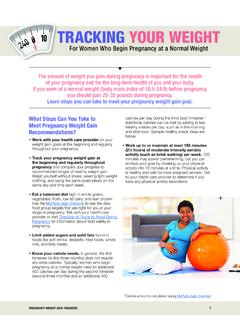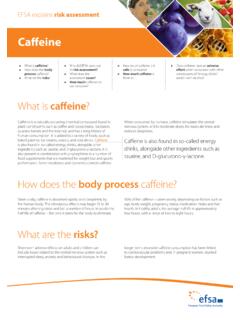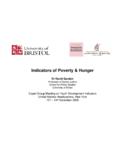Transcription of CLINICAL PRACTICE GUIDELINE Nutrition During Pregnancy
1 CLINICAL PRACTICE GUIDELINE Nutrition During Pregnancy . CLINICAL PRACTICE GUIDELINE . Nutrition During Pregnancy Institute of Obstetricians and Gynaecologists, Royal College of Physicians of Ireland and Directorate of CLINICAL Strategy and Programmes, Health Service Executive (Endorsements pending). Version Date of publication: Nov 2019. GUIDELINE First Published: July 2013. Revision Date: Nov 2022. i CLINICAL PRACTICE GUIDELINE Nutrition During Pregnancy . Table of Contents Summary of Recommendations ..1. Key Recommendations .. 2. Purpose and Scope .. 6. Background and Introduction .. 6. Methodology .. 8. guidelines on Gestational Weight Gain .. 9. Body Mass Index (BMI) .. 9. Gestational Weight Gain (GWG) .. 10. Underweight .. 12. Multi-fetal Pregnancy .. 13. Bariatric Surgery .. 13. Lactation and Postpartum .. 13. guidelines on Macronutrients .. 15. Energy .. 15. Carbohydrate and Fibre .. 16. Protein .. 18. Fat .. 20. guidelines on Micronutrients.
2 23. Folate/Folic Acid .. 23. Iron .. 25. Calcium .. 28. Vitamin D .. 30. Iodine .. 32. Hydration .. 34. guidelines on food safety .. 35. Toxicological Substances .. 35. food Borne Illness .. 38. Specific Diets .. 44. Allergies .. 44. Hospital Equipment and Facilities .. 44. i CLINICAL PRACTICE GUIDELINE Nutrition During Pregnancy . Provision of Information on Best PRACTICE for Infant Feeding .. 45. Implementation Strategy .. 45. Key Performance Indicators .. 46. Qualifying Statement .. 48. References .. 49. Appendix 1 Useful websites ..65. Appendix 2 Recommended daily macronutrient intakes . 66. Appendix 3 Recommended daily micronutrient intakes . 67. ii CLINICAL PRACTICE GUIDELINE Nutrition During Pregnancy . Summary of Recommendations for Nutrition in Pregnancy 1. All women who may possibly become pregnant within the next three months, whether intentionally or not, are advised to take oral FA (FA) 400. micrograms daily to prevent Neural Tube Defects (NTDS); higher does are required preconception & in the first trimester for those with a higher risk of neural tube defects (NTDs) history of NTDs, obesity or pre-existing diabetes mellitus.
3 2. Pregnant women and women planning Pregnancy should be encouraged first and foremost to eat a healthy, balanced diet incorporating foods based on the national food Pyramid sources of iron, calcium, vitamin D and long chain omega-3 polyunsaturated fatty acids are particularly important. 3. Additional vitamin D3 10 g is recommended daily During Pregnancy to support intake. A Pregnancy multivitamin is a simple way to achieve this. 4. food safety is enhanced by good food hygiene and avoiding foods or food supplements which may be teratogenic or harmful to development. 5. All women booking for antenatal care should have their Body Mass Index calculated accurately. 6. Ideally women who are underweight, overweight or obese should be seen by a dietitian for pre- Pregnancy dietary counselling in the community to optimise weight prior to conception and therefore reduce associated risks During Pregnancy . Separate guidelines are available for obesity & Pregnancy , diabetes in Pregnancy and for nausea, vomiting and hyperemesis gravidarum.
4 1. CLINICAL PRACTICE GUIDELINE Nutrition During Pregnancy . Key GUIDELINE Recommendations Gestational Weight Gain All pregnant women must have an accurate weight, height and body mass index (BMI) measured and recorded at the first antenatal visit. Use BMI to screen women at increased risk for weight-related co-morbidities. Pregnancy is a time when women are keen to receive more information about healthy lifestyle interventions and are motivated to make positive choices. Antenatal appointments offer an opportunity to utilise the brief intervention model outlined in the Making Every Contact Count (MECC). Framework. Women who are identified as underweight (BMI < kg/m2) at booking require monitoring for weight gain and referral to a dietitian for assessment. Encourage women to achieve a healthy weight before conception to prevent associated complications. Advise postnatal weight loss in overweight and obese women and, where available, refer to a community dietitian.
5 Macronutrients Energy Advise women that their dietary energy requirements in the beginning of Pregnancy increase only marginally from pre- Pregnancy levels. Encourage women to focus on eating well and not only on eating more. Energy requirements vary depending on a woman's age, BMI, number of fetuses and activity level. Caloric intake should be individualised based on these factors. Carbohydrate and fibre An RDA of 175g per day is set, based on adequate blood glucose for utilization by the maternal and the fetal brain. This can be met with 3. servings of fruit, 2 servings of vegetables, 3 servings of milk or yoghurt and 3 servings of whole grains. Women are encouraged to eat a variety of whole grains, fruit, vegetables, legumes (starchy beans, lentils and pulses), nuts and seeds to meet fibre requirements. Protein Adequate dietary protein intake throughout Pregnancy is essential to ensure normal growth and development of the fetus. Two servings of protein foods per day in the first and second trimester and three servings in the third trimester will meet these requirements.
6 For women who are undernourished or underweight, a balanced protein/energy nutrient supplement may be useful in Pregnancy , but only under medical and dietetic supervision. 2. CLINICAL PRACTICE GUIDELINE Nutrition During Pregnancy . Fat National healthy eating guidelines are applicable to pregnant women in relation to fat intake. Pregnant women should be advised to minimise or avoid dietary intake of trans- fatty acids During Pregnancy by avoiding fried foods, bakery items and other highly processed foods. Hydration Adequate fluid intake During Pregnancy is 2,300 ml/day (EFSA, 2010). Requirements increase in warmer ambient temperatures and with physical activity. Estimating requirements becomes vital within CLINICAL settings for women who are unwell and not able to eat or drink liberally. Encourage women to drink to maintain pale, straw-coloured to transparent yellow urine with urination frequency of minimum 3-4 times per day Micronutrients Folate/Folic acid All women who may possibly become pregnant within the next three months, whether intentionally or not, are advised to take oral FA (FA) 400.
7 Micrograms daily to prevent Neural Tube Defects (NTDS). Women who intend to become pregnant are advised to start FA at least 6. weeks before they start trying to conceive so that their folate levels are optimised before closure of the neural tube. Women who are at increased risk of a Pregnancy complicated by a NTD. should arrange to see their doctor because they may need a prescription- only higher dose of FA daily. Women who are prescribed mg before Pregnancy should continue on the same dose for the first trimester After the first trimester and During breastfeeding, all women are advised to take FA 400 micrograms to meet the World Health Organization's recommended daily intake for Pregnancy and breastfeeding. Iron During Pregnancy , a supplement containing 16-20 mg of iron in addition to a balanced diet has the potential of reducing incidence of anaemia in the healthy population. Women suspected of iron deficiency require a full blood count (FBC) and, if possible, check serum ferritin.
8 The treatment for iron deficiency anaemia is oral supplementation of 100-200 mg per day as elemental iron. Supplements 3. CLINICAL PRACTICE GUIDELINE Nutrition During Pregnancy . that contain 305 mg ferrous fumarate or 325 mg ferrous sulphate are equal to 100 mg elemental iron and readily available. Calcium Pregnant women are advised to eat sufficient calcium rich foods to achieve an intake of 1000 mg per day. Three servings of milk, yogurt, cheese or fortified plant-based alternatives within a varied diet provide adequate calcium for most women. Women who have a low calcium intake are advised to take a daily supplementation to meet requirements. Vitamin D. All pregnant women in Ireland should take a supplement containing 10micrograms (400 IU) Vitamin D3 per day in addition to inclusion of vitamin D rich foods such as fortified milk and oily fish. Iodine Women of childbearing age, and especially those planning a Pregnancy , should ensure that they meet the adult requirement of 150 micrograms iodine daily.
9 Iodine requirements increase to 200 micrograms daily During Pregnancy and breastfeeding. Two or more servings of milk or yogurt and eating white fish once a week is recommended. A prenatal multivitamin supplement containing 200 micrograms iodine daily may be required if dietary sources are inadequate. food safety Practicing food safety is important During Pregnancy to reduce exposure to toxicological substances and pathogens which may cause harm to the woman and fetus. (See Tables 10 and 11). Specific Diets Refer pregnant women who require therapeutic diets to a dietitian. Allergies It is not recommended that women avoid potentially allergenic foods During Pregnancy unless she herself is allergic to a specific food . Women who avoid food groups due to allergy or intolerance are at risk of inadequate intake of nutrients. A referral to a dietitian is warranted in these cases. Hospital Equipment and Facilities 4. CLINICAL PRACTICE GUIDELINE Nutrition During Pregnancy .
10 A digital weighing scale and a wall-mounted stadiometer (height measure). should be available. The centre must ensure equipment is available in a discrete area and calibrated as per manufacturer instructions to accurately record measurements. Hospitals should have access to phlebotomy and laboratory testing. Provision of Information on Best PRACTICE for Infant Feeding It is the responsibility of all healthcare professionals to promote best PRACTICE for infant feeding. The National Infant Feeding Policy for Maternity and Neonatal Services and local implementation policy can be found at: Purpose and Scope The purpose of this GUIDELINE is to improve healthcare professionals' knowledge and dissemination of optimal advice on Nutrition During Pregnancy while demonstrating the link between good Nutrition During Pregnancy and a favourable Pregnancy outcome. These guidelines are intended for healthcare professionals who are working in HSE- funded obstetric and gynaecological services in both community and acute services.
